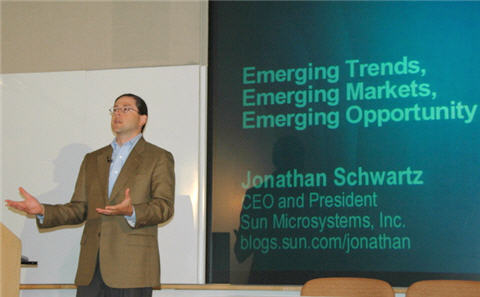Sun's Jonathan Schwartz: Consumers, not IT, driving markets

Sun is holding an Emerging Markets Summit on its Menlo Park, CA campus. CEO Jonathan Schwartz led off the event with this statement: "The Internet is the most powerful social utility the world has ever seen."
The "social utility" phrase is part of Sun's new view of the market, which Schwartz said will be defined by the consuming public rather than traditional IT decision makers.
"A gravitational shift in influence is underway, from enterprises to consumers," he explained. "It is an epoch shift that we are trying to amplify and leverage in our business." It's also a shift to emerging markets, which over the next few decades will be larger than the existing established market
Sun's goal is to provide the "technology utility" solutions to deliver the consuming public services across the Internet.
Schwartz gave an example of consumers driving markets in a financial institution in Africa that was growing banking accounts by passing out phones. The phone allows the value to be stored in the network, which helps bring more efficiency to markets, he said. The phone, and the Internet, is a utility to enable progress. "The Internet is a back channel for the marketplace," Schwartz proclaimed.
The shift in populations from rural to technology-enabled, urban areas, and the number of cities of 10 million or more, is where Sun sees a source of the most significant business opportunity, Schwartz said. The majority of those cities are in emerging markets--Sao Paolo – 18M; Mumbai – 17M; Delhi – 14M; Calcutta – 14M; Rio de Janeiro 11M; Beijing – 11M; Moscow – 11M.
And factoid Schwartz offered is that the bottom 72 percent of the world's population represents $5 trillion in spending power.
By 2050, BRICA (Brazil, Russia, India, China and Africa) countries will represent 44 percent of global GDP, according to Grant Thornton's International Business Report 2007. BRIC countries will grow their IT spend in 2007: Brazil (12.5%), China (16%), Russia (18.7%) and India (21%) respectively (IDC Worldwide Black Book, V. Q2, July 2007).
Supporting the spending habits of the world's population by providing computing infrastructure to the companies providing the products and services consumed is where Sun hopes to break out of the pack.
Sun is banking that whenever the consuming public opens a bank account, sends an email, create a business or makes a video, its products and services will providing the computing power.
"There are two sides to our business, like the carriers and Google," Schwartz said. "Google gives search away for free and monetizes through advertisers. Our business is identical. Financial institutions give free checking and make money on services down the road. We define the technology, brand and standards to bring as many people on line in the most affordable way."
Sun is also banking that its free and open source software strategy will accelerate its growth. "Market share gain in revenue will be a market share gain in adoption," Schwartz said, citing Java, GlassFish and OpenSolaris as Trojan horses. "[Growth] doesn't happen day you pick up the OS. It happens more over time. If look at comparison of adoption metrics, Red Hat or JBoss, it would be interesting," noting that it took those open source companies several years to gain what could be considered market success.
The big question for Sun is when the company will show the kind of growth in revenue that it experienced in the first wave of the Internet? Sun won't be alone in seeing the opportunity in emerging markets and the increasing dependence on technology as a way of life.
Schwartz said that Sun's focus on free software and open source software, like OpenSolaris and Java, and free services, such as what Google and Yahoo offer, are most impactful in defining how consumers experience the world, and that the handset and mobile devices is how most people on the planet will experience the Internet.
Sun, which just changed its ticker symbol from SUNW to JAVA, touts the adoption of Java--more than 4 billion Java devices (1.2B+ Java powered phones, 2B+ Java Card objects, 800M PCs, 6M settop boxes)--as an example of its prowess.
With technologies like Java, Schwartz believes that Sun is in an advantageous position relative to competitors because of its shift to open source and focus on standards-based computing and innovation.
"It's not a guarantee, since we offer free and open products, and we do a lot of what looks like non-economic activity to get more people to join the net.," Schwartz said. But at some point they will drive the adoption of technology, he said, and Sun expects to intercept the its share of the insatiable demand.
Sun is building up its relationships with governments that favor open source. "When we have dialogs with governments, all of the sudden we are talking the same language. Governments have figured out that technology has become a social utility. You don't want to be locked into proprietary technology and they want to have the next Google come out of their nations," Schwartz said.
Schwartz is taking the long view at a time when speed and volume of growth are what get rewarded. "At the end of the day, we are attempting to focus in the next wave of developers, students, research and economic development so we can best position Sun for growth in next decade, not in next quarter or few weeks," Schwartz said.
As long as Sun shareholders and board members are willing to be patient, Schwartz has the right vision of the future. Now he has to prove that Sun has the muscle to intercept the massive demand on the horizon.
